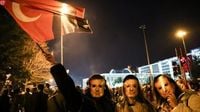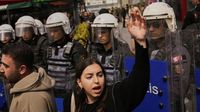In a significant legal proceeding that has drawn national attention, a trial involving 189 suspects began on April 18, 2025, at the Caglayan courthouse in Istanbul, following a government crackdown on protests ignited by the arrest of opposition mayor Ekrem Imamoglu. The protests erupted after Imamoglu was detained on March 19 and subsequently jailed on corruption charges, which many view as politically motivated.
The court was filled with family members, journalists, university lecturers, and lawmakers from the main opposition Republican People's Party (CHP), as the defendants faced serious allegations including "taking part in illegal rallies and marches" and "failing to disperse despite police warnings." If convicted, the suspects could face prison sentences ranging from six months to four years.
Among the defendants are primarily university students, alongside eight Turkish journalists who were reportedly covering the protests. Lawyer Veysel Ok, representing the journalists, argued for their acquittal, stating, "They were there as journalists to cover the protests … that’s what they are paid for." However, the judge denied the acquittal request, although he did agree to separate their case from that of the students.
According to the indictment, the claim by the journalists that they were present for reporting purposes was dismissed because the police did not establish their journalistic intent. Erol Onderoglu, the Turkey representative of Reporters Without Borders (RSF), criticized the prosecution, asserting that the journalists were being tried based on false evidence. He remarked, "Unfortunately, their prosecution is as arbitrary as their detention and arrest."
Many of the students were first-time protesters, as large-scale rallies have been rare since the 2013 Gezi Park protests. Avni Gundogdu, co-founder of The Parents’ Solidarity Network, expressed concern for the youth, saying, "We want justice for our children. They need to be at their desks in university, not in prison."
The Istanbul prosecutor’s office has indicated that a total of 819 individuals will face trial across 20 criminal investigations, with Human Rights Watch (HRW) criticizing the "rushed nature and mass scale of the trials." HRW's Europe and Central Asia director, Hugh Williamson, stated, "Given the glaring absence of evidence, it is hard not to conclude that the intended purpose of these rushed trials is to send a warning against exercising the rights to peaceful protest or free expression."
Imamoglu, who is seen as President Recep Tayyip Erdogan’s main political rival, has sparked widespread protests across Turkey, despite a government ban on demonstrations in the country’s three largest cities. The police response to these protests has been severe, utilizing teargas, pepper spray, and rubber bullets to disperse crowds, resulting in nearly 2,000 arrests during pre-dawn raids.
Among those in court on April 18, 2025, 62 were charged with carrying weapons or hiding their faces to avoid identification, with one allegation claiming a protestor had a rock in hand. Additionally, 20 individuals were charged with seeking to "incite a crime," based primarily on social media posts expressing a desire to join protests and making statements against the government, rather than any calls for violence.
As the trial commenced, tight security measures limited access to the courthouse, prompting hundreds of family members and supporters to protest outside. Many voiced their demands for justice, emphasizing that the demonstrators were exercising their constitutional rights. Derin Doga Kus, an Istanbul University student who had been detained on March 24 and spent 18 days in Silivri prison, shared her experience, stating, "This is not a legal process; it is a process where the law is trampled on."
Avni Gundogan, father of another defendant, joined the crowd outside the courthouse, insisting that the students engaged in peaceful and legitimate activities. "They exercised their constitutional rights, and their rights were violated," he asserted, calling for a verdict of acquittal for the students.
As the proceedings continue, the implications of this trial extend beyond the courtroom, reflecting broader tensions in Turkey regarding freedom of expression and the right to protest. The government's crackdown on dissent has raised alarms among human rights organizations, which warn that such actions threaten the very fabric of democracy in the country.
The situation remains fluid, with many watching closely to see how the courts will handle these high-profile cases and whether the defendants will receive a fair trial amidst a climate of political repression.
As the trial unfolds, it serves as a stark reminder of the challenges faced by those who dare to voice dissent in Turkey, where the line between lawful protest and criminality is increasingly blurred.





